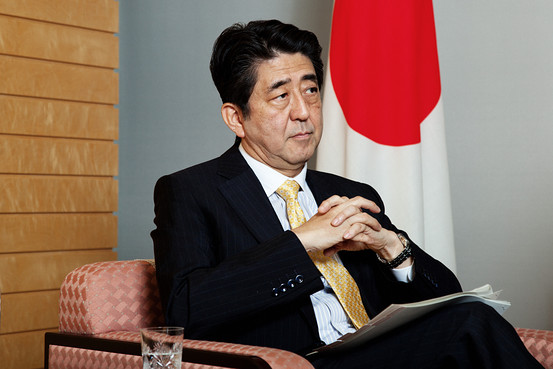When Right is Wrong: How Excessive Political Leanings Undermine the Security Goals of Japan
 Japan is in an unusual position. During a time of global change, the country has an opportunity to alter its course of history. For the first time since 1945, Tokyo has the opportunity to modify its legislation that prevent the nation from forming a standalone military force separate from their joint defense initiative. It seems as if every time there are measures that move momentum towards the direction of change, there is an equal force holding it back. This time it is in the form of ultranationalist accusations.
Japan is in an unusual position. During a time of global change, the country has an opportunity to alter its course of history. For the first time since 1945, Tokyo has the opportunity to modify its legislation that prevent the nation from forming a standalone military force separate from their joint defense initiative. It seems as if every time there are measures that move momentum towards the direction of change, there is an equal force holding it back. This time it is in the form of ultranationalist accusations.
Recently, the Abe administration has come under fire due to Japan’s involvement of a nationalist kindergarten in Osaka. Tsukamoto Kindergarten is a school in Western Japan that subscribes to an ultranationalist view of history, revering the Emperor and promoting ideals of patriotism. Children who attend the institution are to recite old folk songs that praise prewar canons and look to see the country through a right-wing lens. This situation is problematic, as instances of xenophobia and racism run rampant, with distasteful tenets espoused towards “foreigners” in the country. Furthermore, the organization that supplies the scholastic material to the school has business affiliations with President Abe, his wife, and defense minister Tomomi Inada.
For example, Moritomo Gakuen, a private educational firm, supports the nationalist kindergarten as well as other political groups in Japan. Yasunori Kagoike, the leader of the company, has come under fire due to the alleged ties with the current government administration, as well as with direct contact with the Abe family. In fact, Akie Abe, wife of President Abe, was slated to be the “honorary principal” of a new elementary school being built by owners of Tsukamoto Kindergarten. To make matters worse, other reports of backroom deals to acquire land for the construction of the school caused an uproar with the Japanese public.
From a foreign policy standpoint, it is evident how problematic this situation is, as the diplomatic trust built by President Abe towards extending an olive branch to China and Korea raises eyebrows of concern. How can the president want to create a better East Asia built on understanding, when you support ideologues who want to promote a revisionist version of history? Although Japan still has a formidable ally in the United States and is compelled to defend its shores due to Article 5 of the Constitution, scandals involving rhetoric that embellishes and denies past wounds creates more difficulty for unsettling wounds to heal.
Additionally, it is no secret that the current administration is looking to increase its military capability and security imperatives by skirting around the constitutional sanctions imposed after WWII. With President Trump stating that Japan and its allies should contribute more to burden sharing in East Asia, this is an opportunity for the Abe administration to put forth legislation that adjusts the statutes of Article 9. However, the Administration’s ties to right-wing organizations such as Nippon Kaigi, as well as supporting firms that promote an agenda that does not fit the global narrative is counterproductive and creates uncertainty with neighboring states. Emerging political scandals impede the chance for Japan to realize its security goals, getting in the way of real progress towards embracing a new future. Paradoxically, ultranationalist bravado keeps Japan further away from these goals, as the U.S. thumb on their dealings remains ever present. How can Japan unshackle these accusations?
-Removing the opportunity for neighboring states to score “political points” in elections by riding on the coattails of anti-Japanese sentiment
-Strengthening diplomatic imperatives by bolstering economic opportunities
-Influencing allied states to promote Japanese security and self-defense realizations
Such goals are possible if the geopolitical importance is paramount. Finding ways to work with the international community as opposed to espousing divisive narratives support Japan’s current goals. However, it is evident that the current administration must walk a tightrope between two worlds: one that seeks to globalize and engage with the international community, and another that looks to rekindle old ideologies of exclusionism and fear of “the other.” Both viewpoints are seeking the revitalization of the Japanese ethos of independence, but are approaching this goal from different ends. The Abe administration must realize that playing both sides of the fence may be too costly in terms of achieving the overall objectives of the country. One is to remember a virulent past to ensure that seeds of jingoism do not take root once more.
Just as how some scholars argued that the cultural push in America through identity politics was the catalyst to fuel the rise of Trump, such polarizing actions of the Japanese government lead to more uncertainty in the region. If Tokyo can temper the outcries of its opponents, then carving out an alternative future is within its grasp.
The opinions expressed here are solely those of the author.
Related posts:
Category: FOREIGN POLICY & SECURITY, POLITICS, SOUTH ASIA & ASIA PACIFIC

